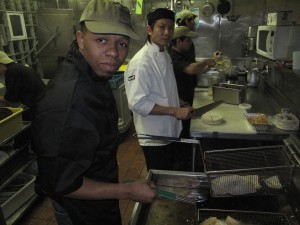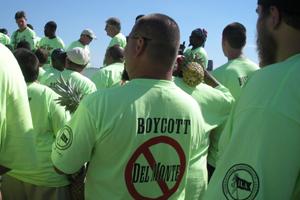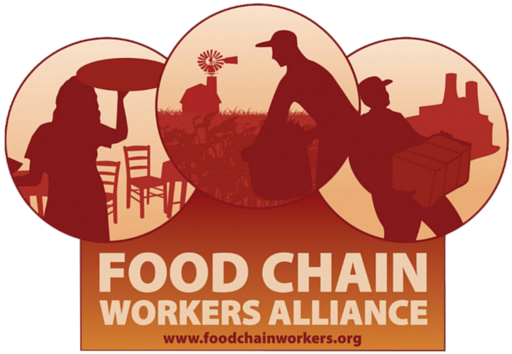Food and the Mandate for Racial Justice
by Rev. David L. Ostendorf * September 29, 2010
 Midst all the manifestations of the so-called “food movement” in the U.S.—organic, slow, sustainable, natural, whole, healthy, urban, sovereign—is a glaring absence of analysis of the structure of race that pervades the entire food system, from the ground to the grocer.
Midst all the manifestations of the so-called “food movement” in the U.S.—organic, slow, sustainable, natural, whole, healthy, urban, sovereign—is a glaring absence of analysis of the structure of race that pervades the entire food system, from the ground to the grocer.
Wherever food is produced, picked, processed, packed, or purveyed low wage workers of color predominate in the hard, dangerous, low-wage jobs that feed a nation built on cheap food, cheap labor, and rampant exploitation of food workers within a toxic framework of abiding racial structures spanning rural and urban America alike. And wherever food is sought by those who can least afford it, those same racial structures prevent or prohibit access to decent, nutritious, and affordable food. If all people are to be well-fed with good, healthy, affordable food there can be no avoidance of this fundamental reality of the food system.
Food justice must be grounded in racial justice. And a just food movement itself must be organized within a comprehensive framework that includes leadership of immigrants, refugees, and African Americans who are the mainstay of the food system and, concurrently, among the most vulnerable of food consumers. Countless low-wage food workers and consumers of color, in short, cannot afford or don’t have access to the “good food” that constitutes the mantra of the emerging food movement(s). “Slow food” is a distant reality; no food may be closer to a daily regimen.
In towns and cities across the country low-wage food workers of color are organizing. The decades-long (and continuing) struggle of farmworkers broke barriers once considered insurmountable. Organized labor (particularly the United Food and Commercial Workers Union) is stepping up. And in largely unorganized food worker settings, the emerging Food Chain Workers Alliance and its member organizations are breaking new ground and forging new relationships with and among workers along the entire food chain, “…to build a more sustainable food system that respects workers rights, based on the principles of social, environmental, and racial justice in which everyone has access to healthy and affordable food.”
In the context of rampant unemployment, particularly among African Americans; the anti-immigrant onslaught aimed at denying low-wage worker rights; rising poverty; and the ever-widening gap between the haves and have-nots, access to healthy and affordable food is fundamentally intertwined within the lasting mandate for racial justice. The possibilities for expanded local organizing, cross-sector alliances, and food worker/racial justice/immigrant rights/labor/farmer/rancher/consumer coalitions led with people of color lie within reach. The will to support and build the local organizing framework fundamental to such coalitional commitments—and to the emergence of a food movement that is indeed racially just—is unknown. The time is upon us to make our will known.
Wildcat Strikes Halt East Coast Shipping

Members of the Longshoremen (ILA) brought the New York-New Jersey port complex to a halt, honoring a picket line by Philadelphia ILA members who came to protest the Del Monte fruit company’s plans to go non-union. Photo: Local 1291.
Longshore workers shut down the East Coast’s biggest port yesterday for the first time in decades. Members of the Longshoremen (ILA) brought the New York-New Jersey port complex to a halt, honoring a picket line by Philadelphia ILA members who came to protest the Del Monte fruit company’s plans to go non-union. Photo: Local 1291.
UPDATE!
Wednesday afternoon, after the major shipping carriers agreed to participate in negotiations in Philadelphia over Del Monte’s use of non-union labor, the ILA announced a return to work of New York-New Jersey and Baltimore workers. It appeared that all charges against the union would be dropped.
Longshore workers shut the East Coast’s biggest port yesterday. Members of the Longshoremen (ILA) brought the New York-New Jersey ports to a halt, honoring a picket line by Philadelphia ILA members who came to protest the Del Monte fruit company’s union-busting.
Longshore workers shut down the East Coast’s biggest port yesterday for the first time in decades.
Members of the Longshoremen (ILA) brought the mammoth New York-New Jersey port complex to a halt, honoring a picket line by ILA members from Philadelphia. The Philadelphia dockers had come to the much larger New York port to protest the Del Monte fruit company’s plans to go non-union in Philadelphia.
Click here to read the rest of the article.
